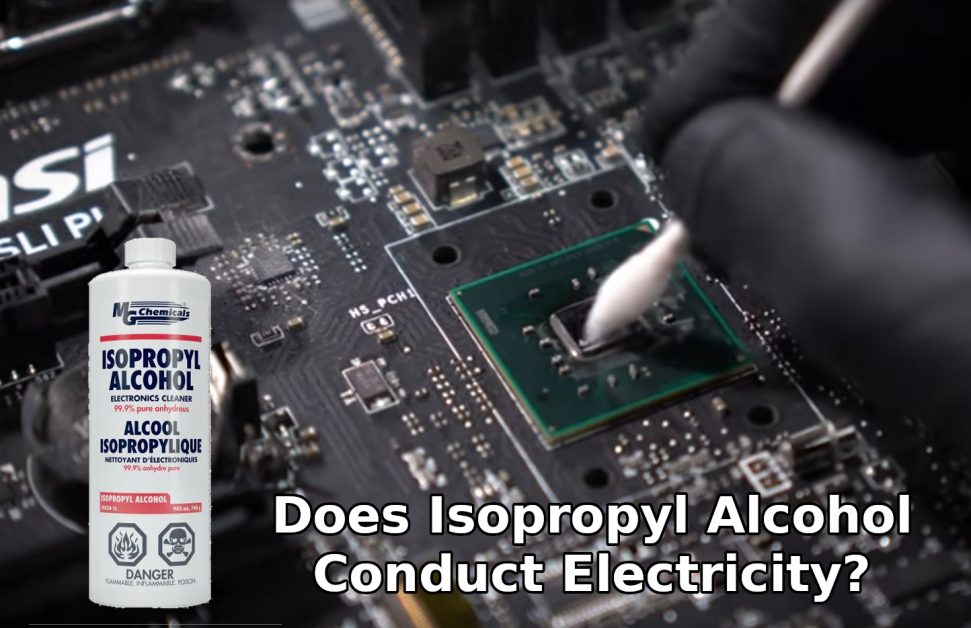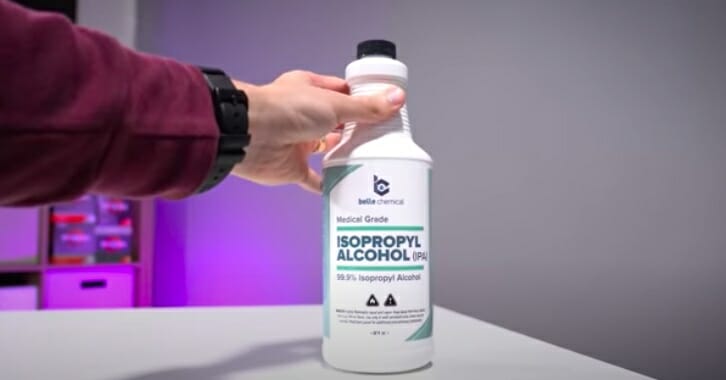Does Isopropyl Alcohol Conduct Electricity?

Isopropyl alcohol is used to clean surfaces and as a solvent. Some people believe that it can also conduct electricity. Is this true?
Before explaining in detail, here’s the short answer:
Yes, isopropyl alcohol does conduct electricity, but its conductivity is so minute that it can be effectively regarded as being non-conductive. It is generally safe to use to clean electrical components and contacts as long as certain precautions are taken.
Continue reading to find out more.
Does Isopropyl Alcohol Conduct Electricity?
For general purposes, it can be assumed that alcohol does not conduct electricity.
It does not have electrons as free as metals, enabling electricity to flow easily. However, isopropyl alcohol is usually a mix of approximately 70% alcohol and 30% water. The water component is more electrically conductive. A higher concentration of isopropyl alcohol usually has 90% alcohol and 10% water, so relatively, it is less electrically conductive.
A Technical Explanation
No material has an electrical conductivity of absolute zero, i.e.; there is nothing that does not conduct electricity at all.
Materials only differ in the extent to which they conduct electricity. For most intents and purposes, those with very low conductivity, as in the case of isopropyl alcohol (C3H7OH) are considered non-conductors of electricity. Their conductance only matters when the value is not negligible, as at the micro level.
Typically, isopropyl alcohol has an electrical conductivity of around 6 μS.m−1 (6 micro Siemens per meter). In comparison, the electrical conductivity of metals is several millions of S.m−1.
Why Isopropyl Alcohol’s Conductance Matters
Isopropyl alcohol is used in several ways. For example, it is used:
- To clean electronic components, connectors, and boards.
- To remove components on which thermal paste has been used, such as CPUs/GPUs.
- As a cleaner in DIY projects.
- For sanitizing during makeup and for hair removal.
As you can see, isopropyl alcohol is mainly useful as a cleaner or sanitizer.
It can kill germs easily, so it is used to wipe surfaces. It is also a major component of rubbing alcohol. However, it is best used where you need to clean grease or remove a sticky substance. An alcohol-based cleaner with 70% isopropyl alcohol will work well (and is safer than using one with a higher alcohol concentration).
Otherwise, an ordinary non-alcohol cleaner may suffice. Hot water and soap are easier to obtain, safer, and cheaper for general cleaning.
Be careful! Isopropyl alcohol is highly flammable. Don’t apply too much in places where this matters, i.e., in places exposed to heat.
Important, when used to clean electronics, that is where its electrical conductance matters most. As this is negligible, it can be used safely to clean all types of electrical components and contacts. It also evaporates quickly at room temperature when exposed to air.
Be careful! When cleaning an electrical board, component, or contact, it should not be connected to a power source. Otherwise, a short circuit may occur. Power it off before applying isopropyl alcohol, allowing sufficient evaporation time.
More Tips to Clean Safely Using Isopropyl Alcohol

Here are a few more important precautions when using isopropyl alcohol:
- You only need to apply a small amount of isopropyl alcohol. Use a soft tissue, cotton bud, or clean cloth.
- Applying a large amount in an enclosed environment can harm health. Only use isopropyl alcohol in a well-ventilated area.
- Isopropyl alcohol is only suitable for external use. It can be fatal if consumed.
If electrical conductivity is a concern, you can use alternatives to cleaning with isopropyl alcohol, such as compressed air or cleaning wipes.
Wrapping Up
Technically, isopropyl alcohol does conduct electricity, but the extent to which it does is minuscule and usually negligible. Its conductivity is mainly a concern when cleaning electronics. It is generally safe to use for this purpose as long as a few precautions are taken.
First, to clean an electrical board, component, or connection, power off the device, apply only a little isopropyl alcohol, and allow it to evaporate before using the device. If its conductivity is a matter of concern, you can use safer and cheaper alternatives. Still, isopropyl alcohol is better for a thorough cleaning, like when you need to remove grease or other debris from electrical components.
References
Website Resources:
- CPUs. https://www.tomshardware.com/reviews/best-performance-cpus,5683.html
- evaporate. https://www.usgs.gov/special-topics/water-science-school/science/evaporation-and-water-cycle
Video References:
Greg Salazar
